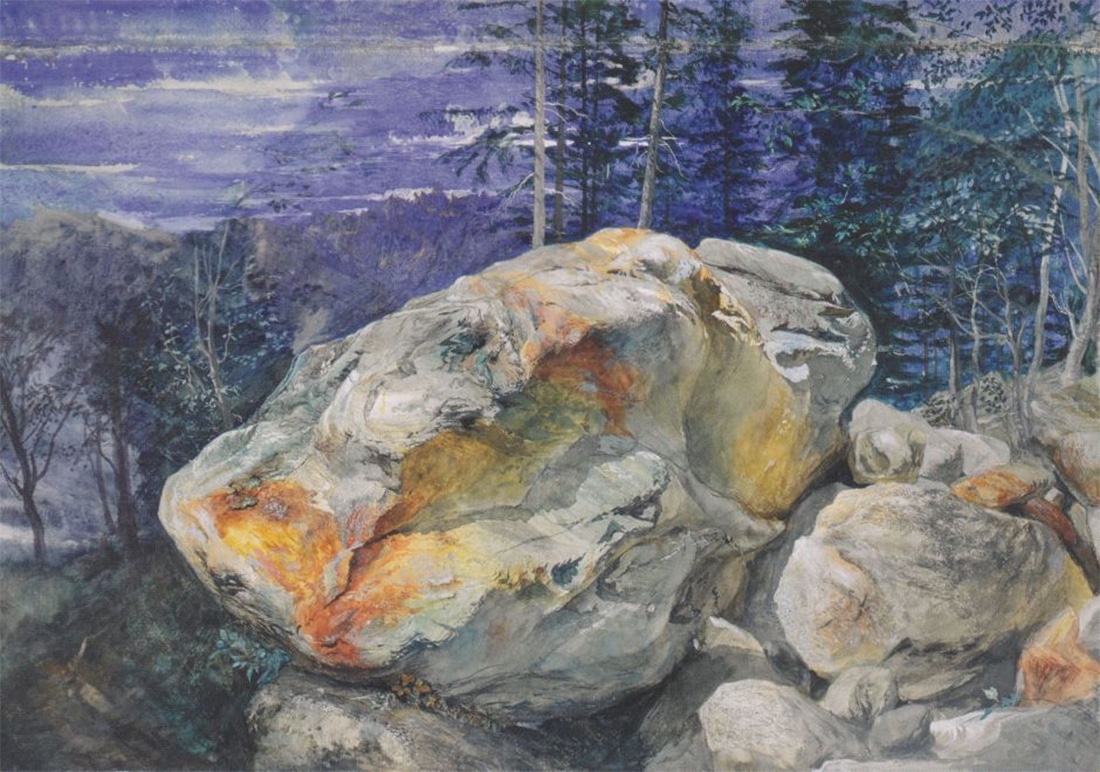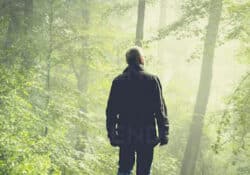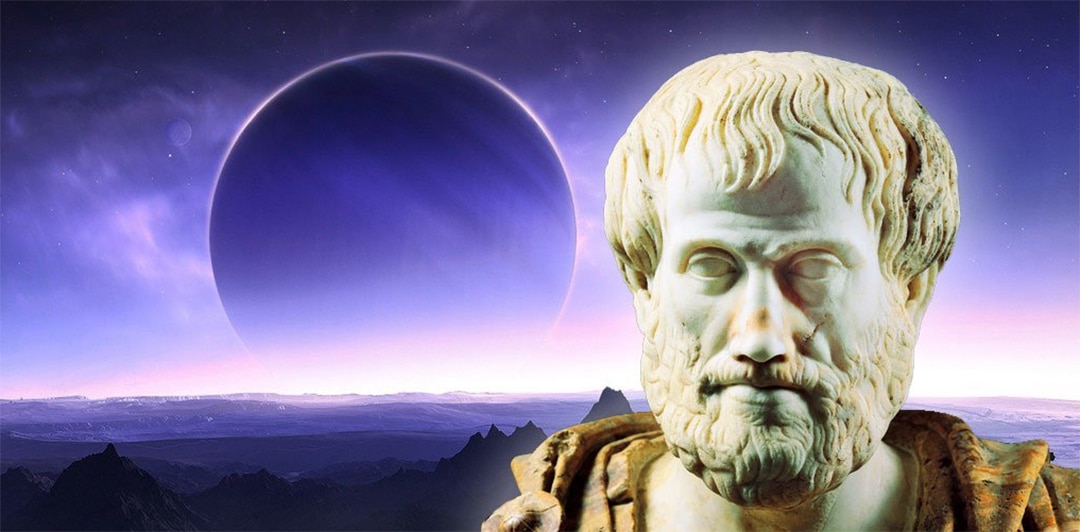

By John Ruskin (1819–1900), Fragment of the Alps (1854-56), watercolor and gouache over pencil on paper, 33.5 × 49.3 cm, Harvard Art Museum, Cambridge, MA. Wikimedia Commons.
Does Nature Have Rights?
Ruskin scholar Jeffrey Spear, author of “Dreams of an English Eden: Ruskin and his Tradition in Social Criticism,” discusses how the insights of a key 19th-century thinker can help us build a new paradigm for protecting the planet – and save us from ourselves.
Since I first wrote about the Victorian art and social critic John Ruskin, economics, and the environment over 40 years ago, the foreboding cloud of ecological disaster then on the horizon has become experiential climate change. Human activity has initiated the 6th great extinction in the planet’s history threatening at least 25% of Earth’s species and, if not humans as a species, certainly the ethos of perpetual economic and population growth dependent on fossil-derived fuels and chemistry.
Ruskin challenged the premises of the Liberal economic order in terms that are, if anything, more relevant today than in 1860 when he declared the first principle of his economics: “There is no wealth but life.” Consequently, “that country is the richest which nourishes the greatest number of noble and happy human beings; that man is richest who, having perfected the functions of his own life to the utmost, has also the widest helpful influence, both personal and by means of his possessions, over the life of others.”[1] Given when he wrote, it is no surprise that Ruskin privileges human life, but the expansion to all life does not alter the underlying principle. The opposite of this wealth is not poverty, but what Ruskin called “illth,” not simply what is literally to death devote, like weapons, but also the things that must be consumed to maintain human life ranging from the byproducts of agriculture and husbandry, to the resources we take from the earth, to industrial waste and wear and tear on the body itself. The goal is to produce the most wealth, that is the greatest abundance of healthy life, with the least possible illth. Progressive economists like Herman Daley in The New York Times make the same point, but with no polemical punch. Does growth, he asks, really increase wealth? Is it making us richer in any aggregate sense, or might it be increasing costs [he includes environmental costs] faster than benefits making us poorer?” Ilth says it all in one word.
Ruskin formed his ideas before Marxism provided a potential alternative to the capitalist order, so his radical critique of economic liberalism called into question the underlying assumptions of industrialism itself, not just its capitalist expression; likewise, his rejection of competition does not imply a socialist alternative. The combination of influences that led Ruskin to criticize the liberal economic order at the moment of its triumph in Victorian Britain were unique, but several have a place in contemporary analyses, so I will begin with a brief account of assertions Ruskin made that have gained urgency since his time; then recount how the post-Romantic aspect of his critique has, in effect, been reborn as the literature of re-enchantment and conclude with reasons why the Rights of Nature legal movement, if it can be established — and that is a big if — has the potential to be both transnational and more effective than environmental legislation.
Ruskin was born in 1819 into a strict evangelical household. He was drilled by his mother on the Bible, the Scottish paraphrases, and Adam Smith’s Theory of Moral Sentiments from the time he was a toddler. As an adult, he transitioned to The Wealth of Nations, and, along with much else, regular re-reading of Plato. His first work of social criticism came directly from Smith. It was not the well-known passage on productivity to be gained by the division of labor, but rather the less familiar passage in which the moral philosopher predicts that the division of labor will have so damaging an effect on the physical and mental wellbeing of workers and thus society at large that only intervention by the state on their behalf could prevent it. “It is not, truly speaking,” Ruskin wrote, the labour that is divided; but the men: — Divided into mere segments of men – broken into small fragments and crumbs of life; so that all the little piece of intelligence that is left in a man is not enough to make a pin or a nail, but exhausts itself in making the point of a pin, or the head of a nail” (10:192).
It was an article of Ruskin’s faith that Adam’s God-given assignment to tend the Garden did not end with the Fall, but was transformed into the labor of restoring Eden. As the sectarian faith of his childhood faded, he followed the Romantics, particularly Wordsworth, in finding spiritual and moral value, even solace, in Nature rather than its presumptive creator, and a duty to preserve not destroy. Ruskin had nothing against private property, but believed that it was, in effect, held in trust, and that responsible use of natural resources had to take the effect on others into account. The fact that you own riverfront property, can build a factory there, and use the river water, does not give you the right to pollute that water, or dirty the air without any attempt at mitigation. Correspondingly, righteous consumers should consider how the products they purchase came into being, not simply price.
The traditions Ruskin drew upon when examining political economy each imply a test question: the Gospels ask is it moral, moral philosophy asks is it ethical, Plato asks is it just. Looking at the Victorian market economy with its emphasis upon competition, the notion that private greed can be a public good, the positing of an abstract, rational, economic man as a consumer as opposed to the whole human being, assuming profit and return on investment as the purpose of businesses rather than the reward for producing useful goods or services, Ruskin’s answer was no, no and no. What economists like John Stuart Mill tried to add back into the system, the kinds of things now called externalities and such sub-fields as behavioral economics, were to Ruskin essential.
Moreover, the assumption of rational choice in a competitive marketplace neglected an important incentive in that system, the incentive to cheat, whether directly, by say adulterating a product rather than improving it, or indirectly by the advantage of wealth that enables the systemic robbery of the poor by the rich — the reverse, “robbing the rich because they are rich being,” he noted, “rarely practiced by persons of discretion” (17: 58). Using contemporary examples, if it is the purpose of an energy company to provide fuel, it can legitimately raise prices to cover increased costs, but not to take advantage of a tight market to increase profit margins. As for cheating, one need go no farther than the oil companies’ campaign to discredit climate science after their own research confirmed that carbon emissions were a key driver of global warming. Robbing the poor by “taking advantage of a man’s necessities in order to obtain his labour or property at a reduced price” needs no elaboration. It is often effected by “occult theft,” that “hides itself even from itself, and is legal, respectable, and cowardly, [and] corrupts the body and soul” (27: 127). If this language seems unfashionably moralistic, consider the Great Recession and the gap between the common understanding of justice – the perpetrators and profiteers of misery should be jailed – and the fact that what they did was legal under The Commodities Futures Modernization Act of 2000. If the body politic has a soul, surely it is corrupted when what is legal diverges radically from the common understanding of right and wrong.
Free market capitalism violates what Ruskin called “The Law of Help.” Drawing on 19th-century chemistry, Ruskin noted that both animate and inanimate substances consist of atoms that cohere, but while inanimate structures cannot help or repair themselves when injured, living things can. Help is life, helplessness is corruption or death. “The highest and first law of the universe – and the other name of life is, therefore, ‘help.’ The other name of death is separation. Government and co-operation are in all things and eternally the laws of life. Anarchy and competition … the laws of death” (7:207). Although Ruskin comes at it from a religious and Platonic standpoint, the Law of Help approximates what the contemporary materialist Jane Bennett calls Vibrant Matter, which I will get to shortly.
Translated into modern terms, Ruskin thought of both Nature and the economy as interfacing whole systems anticipating the science of ecology and, regarding the economy, something like General Systems Theory. It is now commonplace to see that the segmentation of natural systems into parcels that can be owned and exploited without regard to the whole can alter those systems so radically as to cause the extinction of whole species. I stress that Ruskin thought of the natural order and economic system the same way because we are not used to thinking of individually owned and operated entities doing business with others as parts of a complex interdependent system that is more like a web than a linear progression from production to sales to consumption. This reality has been brought painfully home by the so-called supply chain crisis precipitated by Covid-19. The complex systems of political economy in the broadest sense of that term need to be recognized, and in some way managed or controlled, if we are to avert catastrophe.
In the United States publicly held energy companies advertise going into renewables, but when their dirty assets are neither cleaned nor closed, but keep on producing behind the veil of private equity, the only thing going green is the corporate image. Likewise, the energy savings produced so far by the rising sales of electric vehicles in the US has been offset by the growth of energy-hungry cryptocurrency mining that is keeping coal-fired plants in operation that were supposed to be taken offline and held in reserve. Water rights in the US are a mare’s nest of legal and regulatory complications because surface water and the aquifer have traditionally been treated as distinct entities with differing rules of use and ownership rather than features of the water cycle.
In 1972 Barry Commoner, in The Closing Circle, noted that the wealth of modern societies “has been gained by rapid, short-term exploitation of the environmental system, but it has blindly accumulated a debt to nature.” We have not paid our debt, so Nature has begun to foreclose.
The Neo-Animism of Re-enchantment
Since the Jungian Thomas Moore called ecology a “Sacred science” in The Re-Enchantment of Everyday Life back in 1996 there have been at least 20 books in English dealing with the relationship between humans and nature with enchantment or re-enchantment in the title or centrally referenced. It is a new version of the Romantic and in some cases Christian tradition that Ruskin drew upon, the belief that there is something essentially spiritual in our relationship with the natural world that has been denied to our present and future sorrow by the zeitgeist of industrial and now post-industrial modernity with its abstraction, mechanization, exploitation and the fetishization of perpetual growth. To put it another way, humans have instrumentalized non-human nature at the immediate expense of the non-human, and the long term-expense of humanity itself creating a void once filled by belief that humans were part of Nature, a state of enchantment. “Re-enchantment” is the attempt by writers, largely philosophers, theologians, and social scientists to fill that void. The popular association of “enchantment” with magic practiced by humans, creates a space where believers in religions of the book with their transcendent but omnipresent deity can, as Ruskin did, find a duty of care for nature as we see in books with titles like Alister McGrath’s The Denial of Religion and the Ecological Crisis, or Mark Wallace’s When God was a Bird: Christianity, Animism, and the Re-enchantment of the World. This last title rejects the “otherworldly theologies” of traditional Christianity by treating Christian symbolic metaphors as reversible, making the holy dove akin to Thoth, the Ibis-headed god of learning in ancient Egypt, which may be a hard sell. Ruskin did something similar when he wrote about Athena as the Queen of the Air rather than the Goddess of Wisdom.
In the conventional history of religion animism is the oldest form of belief, but from a secular point of view, it is the newest. The idea that we are mammals and consequently part and parcel of the natural order, not beings apart, goes hand in hand with the discovery that sentience and communication are not the purview of humans alone, nor even mammals, but permeates the natural world. In the words of marine biologist Dominic Vitelli who studies octopuses, “it is not a question of how intelligent they are, but how they are intelligent.” Thanks largely to the work of the Canadian forest ecologist Suzanne Simard, who had to overcome both gender bias and the fact that timber companies fund most forest research, we now know that trees have an elaborate means of communication by way of symbiotic fungi and can share information and nutrition even across species, demonstrating that clear-cutting and monoculture of trees are both self-defeating and a capital crime against nature. As Simard says: trees and plants have agency. They perceive, relate, and communicate… cooperate, made decisions, learn and remember. By noting how trees, animals, even fungi – any and all nonhuman species – have this agency, we can acknowledge that they deserve as much regard as we accord ourselves.” Mistreatment of one species is a mistreatment of all” (Finding the Mother Tree: 294).
For materialists, neo-animism is where science and faith link up with no need for a transcendent spirit. In the light of the new science a leading secular voice, the political theorist Jane Bennet, author of The Enchantment of Modern Life (2001), has dropped enchantment and titled her 2010 materialist manifesto Vibrant Matter: A Political Ecology of Things. “I believe,” she concludes, in one matter-energy, the maker of all things seen and unseen… this pluriverse is transversed by heterogeneities that are continually doing things … it is wrong to deny vitality to nonhuman bodies, forces, and forms… there is a common materiality of all that lives” (122). The literature of re-enchantment expresses a necessary change in attitude but does not advance a direct mechanism for change.
The Rights of Nature
Federal protection of the environment in the United States relies largely on legislation passed in the 1970s and early 80s that established The Environmental Protection Agency, created superfunds to clean up the illth that padded the profits of abstract corporate persons at the expense of flesh and blood, established clean air and water standards, and protected endangered species. In the early 1970s, when smog had turned Los Angeles into a blurry smear below Observatory Hill, the need for regulation clearly justified its attendant expense and bureaucratic hassle, but just as a new generation arose in biblical Egypt that knew not Joseph, so once the air and water cleared, the need for enforcement to maintain or advance clean air and water became obscure to many, and the expense and bureaucratic hassle more problematic. The steady pressure of industry for deregulation and attendant court decisions have hobbled enforcement. This regulation cycle makes essential regulation the victim of its own partial success — not to mention that new computer-based industries have largely evaded both regulation and taxation. Uber and its ilk, for example, have crippled traditional taxed and regulated livery services while increasing the number of cars cruising urban areas increasing congestion and pollution. In Pennsylvania, gas from wells scheduled to be capped is now fueling unlicensed generators powering crypto mining. The seven major crypto enterprises in the US now use as much power as Houston, a city of around 2.5 million people. We need a more comprehensive and international approach in the face of impending disaster and the international Rights of Nature movement is one possible way forward.
Dissenting in the 1972 case Sierra Club versus Morton, William O Douglas, the last of the New Deal Supreme Court Justices, contended that “if a ship is a person for maritime purposes, and a corporation is a person for purposes of the adjudicatory processes … so it should be as respects valleys, alpine meadows, rivers, lakes, estuaries, ridges, groves of trees, swampland, or even air that feels the destructive pressures of modern technology and modern life.” Douglas was paraphrasing a draft of the now classic article and subsequent book by Christopher Stone, Should Trees Have Standing” (1975, 3rd revised edition 2010)(See article below). Arguably an ecosystem has a better claim to limited recognition as a legal entity than a corporation, which has no body and no claim to sentience in and of itself.
In July, the Washburn fire threatened to destroy the Mariposa Sequoia Grove in California even though fire is part of the Sequoia life cycle – but this fire was just too hot. The mother tree of the Grove, the Grizzly Giant, was a sapling when the Roman Reality Show was who killed Germanicus and what will Tiberius do about it, but even a celebrity tree has no direct standing in court to challenge the human activity that threatens its existence. Apart from guardianship arrangements and popular support, efforts to give conditional legal standing to ecosystems in the US have failed whether in appeals court as with Lake Erie or by panicked passage of an actual ordinance against such recognition as happened in Florida. The major successes and current promise for the Rights of Nature have come from another direction, late-stage decolonization. Responding in 2008 to demands from its indigenous population, Ecuador became the first nation to recognize the Rights of Nature in its constitution. In 2010 Bolivia passed a law on the Rights of Mother Earth followed in 2012 with a framework law dealing with implementation. The most famous case is the long struggle of the New Zealand Māoiri to have the sacred status of the Whanganui River recognized by the state. As of 2017, the river became a legal entity called Te Awa Tupua that can sue and be sued. On that model, Colombia granted the Atrato River, its tributaries, and its basin, the right to be protected, preserved, and restored. The High Court of India followed suit in regard to the Ganges and Yamuna rivers, though they were reversed by the Supreme Court not on principle, but in regard to practicality.
The UN’s International Covenant on Civil and Political Rights of 1966, endorsed by the United States, asserts the rights of “ethnic and religious or linguistic minorities have the rights to their own culture” within nation-states. Within that frame, The International Labour Organization Convention no. 169 in 1996 established a framework for empowering indigenous and tribal peoples and their right to define priorities for their own development. A group of nations is now calling for a Universal Declaration for the Rights of Mother Earth. The special promise of the Rights of Nature movement is that it functions both within and between nation-states.
This brings me to my final point. In the homelands of Liberalism, its three pillars —- the rights to life, liberty, and property — are deeply engrained in law and culture along with the legacy of religious traditions that gave man sovereignty over nature. But cultural and religious traditions elsewhere, the Daoism and Hinduism of East and South Asia example, are much closer to those of the indigenous peoples who are leading the way. A recent Law review article by Sequoia Butler argues that “Unlike a treaty rights approach or international human rights approach, environmental personhood allows tribal communities to insert ancestral knowledge and spiritual beliefs into plans aimed at preserving the land.” Following the New Zealand example, the Yurok tribe in Northern California has declared the Klamath River to be a person under tribal law. The same logic could apply to Federal lands in general. As the old animism joins hand with the new there is at least some hope that the Law of Help may be realized with the help of the law.





0 Comments